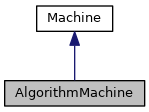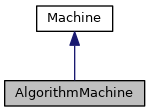|
| def | __init__ (self, algorithm=None, initial_state="init") |
| |
| def | setup_from_dict (self, params) |
| |
| def | is_valid (self) |
| |
| def | initial_state (self) |
| |
| def | initial_state (self, state) |
| |
| def | state (self) |
| |
| def | state (self, state) |
| |
| def | add_state (self, state, enter=None, exit=None) |
| |
| def | add_transition (self, trigger, source, dest, conditions=None, before=None, after=None) |
| |
| def | __getattr__ (self, name, **kwargs) |
| |
| def | get_transitions (self, source) |
| |
| def | get_transition_dict (self, state, transition) |
| |
| def | save_graph (self, filename, graphname) |
| |
|
|
| default_states |
| | Default states for the AlgorithmMachine.
|
| |
|
| algorithm |
| | Algorithm() object whose state we are modelling.
|
| |
|
| input_files |
| | Collector output files, will contain all files retured by the output patterns.
|
| |
|
| dependent_databases |
| | CAF created local databases from previous calibrations that this calibration/algorithm depends on.
|
| |
| | database_chain |
| | Assigned database chain to the overall Calibration object, or to the 'default' Collection. More...
|
| |
|
| output_dir |
| | The algorithm output directory which is mostly used to store the stdout file.
|
| |
|
| output_database_dir |
| | The output database directory for the localdb that the algorithm will commit to.
|
| |
|
| result |
| | IoV_Result object for a single execution, will be reset upon a new execution.
|
| |
|
| states |
| | Valid states for this machine.
|
| |
|
| initial_state |
| | Pointless docstring since it's a property.
|
| |
|
| transitions |
| | Allowed transitions between states.
|
| |
|
| state |
| | Current State of machine.
|
| |
|
| def | _create_output_dir (self, **kwargs) |
| |
| def | _setup_database_chain (self, **kwargs) |
| |
| def | _setup_logging (self, **kwargs) |
| |
| def | _change_working_dir (self, **kwargs) |
| |
| def | _pre_algorithm (self, **kwargs) |
| |
| def | _execute_over_iov (self, **kwargs) |
| |
|
def | _set_input_data (self, **kwargs) |
| |
| def | _trigger (self, transition_name, transition_dict, **kwargs) |
| |
A state machine to handle the logic of running the algorithm on the overall runs contained in the data.
Definition at line 914 of file state_machines.py.
◆ __init__()
| def __init__ |
( |
|
self, |
|
|
|
algorithm = None, |
|
|
|
initial_state = "init" |
|
) |
| |
Takes an Algorithm object from the caf framework and defines the transitions.
Reimplemented from Machine.
Definition at line 936 of file state_machines.py.
936 def __init__(self, algorithm=None, initial_state="init"):
938 Takes an Algorithm object from the caf framework and defines the transitions.
941 self.default_states = [State(
"init"),
943 State(
"running_algorithm"),
947 super().__init__(self.default_states, initial_state)
950 self.algorithm = algorithm
952 self.input_files = []
954 self.dependent_databases = []
957 self.database_chain = []
961 self.output_database_dir =
""
965 self.add_transition(
"setup_algorithm",
"init",
"ready",
966 before=[self._setup_logging,
967 self._change_working_dir,
968 self._setup_database_chain,
969 self._set_input_data,
970 self._pre_algorithm])
971 self.add_transition(
"execute_runs",
"ready",
"running_algorithm",
972 after=self._execute_over_iov)
973 self.add_transition(
"complete",
"running_algorithm",
"completed")
974 self.add_transition(
"fail",
"running_algorithm",
"failed")
975 self.add_transition(
"fail",
"ready",
"failed")
976 self.add_transition(
"setup_algorithm",
"completed",
"ready")
977 self.add_transition(
"setup_algorithm",
"failed",
"ready")
◆ __getattr__()
| def __getattr__ |
( |
|
self, |
|
|
|
name, |
|
|
** |
kwargs |
|
) |
| |
|
inherited |
Allows us to create a new method for each trigger on the fly.
If there is no trigger name in the machine to match, then the normal
AttributeError is called.
Definition at line 295 of file state_machines.py.
◆ _callback()
| def _callback |
( |
|
func, |
|
|
** |
kwargs |
|
) |
| |
|
staticprivateinherited |
Calls a condition/before/after.. function using arguments passed (or not).
Definition at line 330 of file state_machines.py.
◆ _change_working_dir()
| def _change_working_dir |
( |
|
self, |
|
|
** |
kwargs |
|
) |
| |
|
private |
◆ _create_output_dir()
| def _create_output_dir |
( |
|
self, |
|
|
** |
kwargs |
|
) |
| |
|
private |
Create working/output directory of algorithm. Any old directory is overwritten.
Definition at line 1005 of file state_machines.py.
◆ _execute_over_iov()
| def _execute_over_iov |
( |
|
self, |
|
|
** |
kwargs |
|
) |
| |
|
private |
Does the actual execute of the algorithm on an IoV and records the result.
Definition at line 1075 of file state_machines.py.
◆ _pre_algorithm()
| def _pre_algorithm |
( |
|
self, |
|
|
** |
kwargs |
|
) |
| |
|
private |
◆ _setup_database_chain()
| def _setup_database_chain |
( |
|
self, |
|
|
** |
kwargs |
|
) |
| |
|
private |
◆ _setup_logging()
| def _setup_logging |
( |
|
self, |
|
|
** |
kwargs |
|
) |
| |
|
private |
◆ _trigger()
| def _trigger |
( |
|
self, |
|
|
|
transition_name, |
|
|
|
transition_dict, |
|
|
** |
kwargs |
|
) |
| |
|
privateinherited |
Runs the transition logic. Callbacks are evaluated in the order:
conditions -> before -> <new state set here> -> after.
Definition at line 307 of file state_machines.py.
◆ add_state()
| def add_state |
( |
|
self, |
|
|
|
state, |
|
|
|
enter = None, |
|
|
|
exit = None |
|
) |
| |
|
inherited |
Adds a single state to the list of possible ones.
Should be a unique string or a State object with a unique name.
Definition at line 182 of file state_machines.py.
◆ add_transition()
| def add_transition |
( |
|
self, |
|
|
|
trigger, |
|
|
|
source, |
|
|
|
dest, |
|
|
|
conditions = None, |
|
|
|
before = None, |
|
|
|
after = None |
|
) |
| |
|
inherited |
Adds a single transition to the dictionary of possible ones.
Trigger is the method name that begins the transtion between the
source state and the destination state.
The condition is an optional function that returns True or False
depending on the current state/input.
Definition at line 253 of file state_machines.py.
◆ default_condition()
| def default_condition |
( |
** |
kwargs | ) |
|
|
staticinherited |
◆ get_transition_dict()
| def get_transition_dict |
( |
|
self, |
|
|
|
state, |
|
|
|
transition |
|
) |
| |
|
inherited |
Returns the transition dictionary for a state and transition out of it.
Definition at line 347 of file state_machines.py.
◆ get_transitions()
| def get_transitions |
( |
|
self, |
|
|
|
source |
|
) |
| |
|
inherited |
◆ initial_state() [1/2]
| def initial_state |
( |
|
self | ) |
|
|
inherited |
The initial state of the machine. Needs a special property to prevent trying to run on_enter callbacks when set.
Definition at line 198 of file state_machines.py.
◆ initial_state() [2/2]
| def initial_state |
( |
|
self, |
|
|
|
state |
|
) |
| |
|
inherited |
◆ is_valid()
Returns:
bool: Whether or not this machine has been set up correctly with all its necessary attributes.
Definition at line 987 of file state_machines.py.
◆ save_graph()
| def save_graph |
( |
|
self, |
|
|
|
filename, |
|
|
|
graphname |
|
) |
| |
|
inherited |
Does a simple dot file creation to visualise states and transiitons.
Definition at line 358 of file state_machines.py.
◆ setup_from_dict()
| def setup_from_dict |
( |
|
self, |
|
|
|
params |
|
) |
| |
Parameters:
params (dict): Dictionary containing values to be assigned to the machine's attributes of the same name.
Definition at line 979 of file state_machines.py.
◆ state() [1/2]
The current state of the machine. Actually a `property` decorator. It will call the exit method of the
current state and enter method of the new one. To get around the behaviour e.g. for setting initial states,
either use the `initial_state` property or directly set the _state attribute itself (at your own risk!).
Definition at line 216 of file state_machines.py.
◆ state() [2/2]
| def state |
( |
|
self, |
|
|
|
state |
|
) |
| |
|
inherited |
◆ _state
Actual attribute holding the Current state.
Current state (private)
Definition at line 178 of file state_machines.py.
◆ database_chain
Assigned database chain to the overall Calibration object, or to the 'default' Collection.
Database chains for manually created Collections have no effect here.
Definition at line 957 of file state_machines.py.
◆ required_attrs
Initial value:= ["algorithm",
"dependent_databases",
"database_chain",
"output_dir",
"output_database_dir",
"input_files"
]
Required attributes that must exist before the machine can run properly.
Some are allowed be values that return False whe tested e.g. "" or []
Definition at line 921 of file state_machines.py.
◆ required_true_attrs
Initial value:= ["algorithm",
"output_dir",
"output_database_dir",
"input_files"
]
Attributes that must have a value that returns True when tested.
Definition at line 930 of file state_machines.py.
The documentation for this class was generated from the following file:



